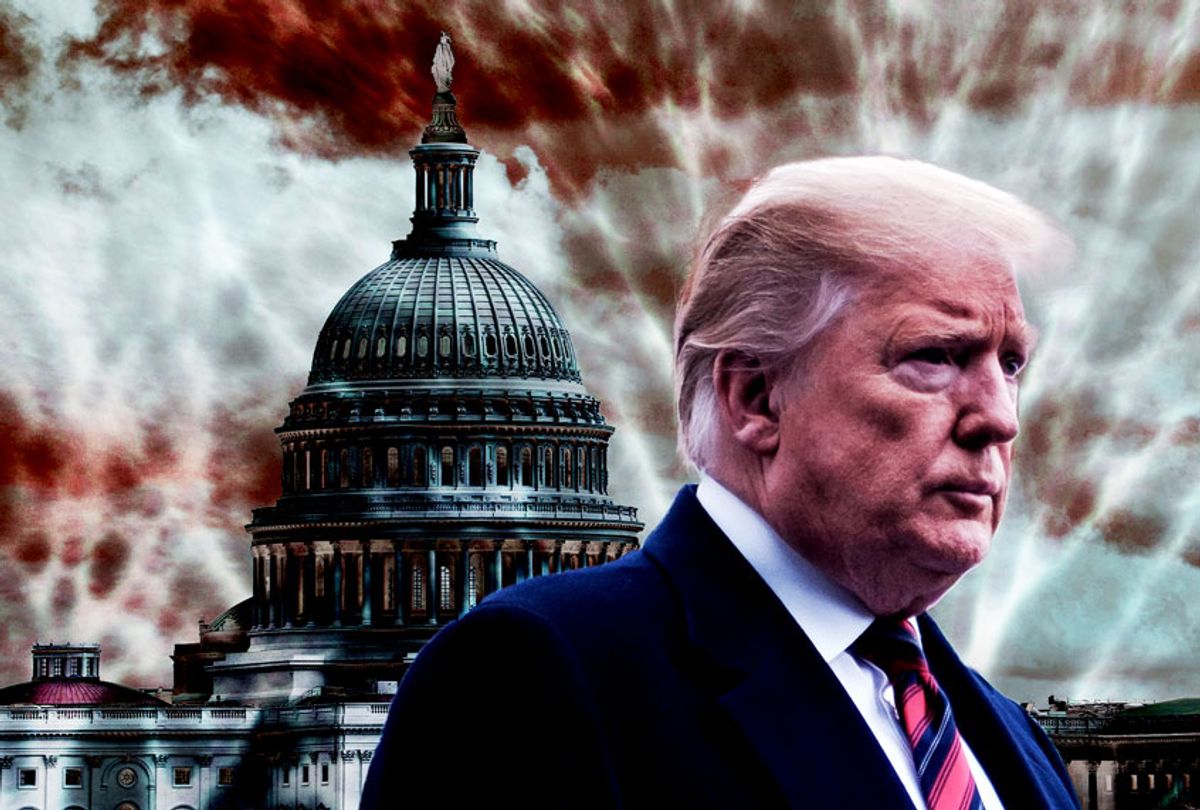Two prominent conservative legal scholars determined that former President Donald Trump is ineligible to be president under a provision in the Constitution barring people who engaged in insurrection from office.
Professors William Baude of the University of Chicago and Michael Stokes Paulsen of the University of St. Thomas — both members of the conservative Federalist Society — studied the question for more than a year and detailed their findings in an article set to be published next year in the University of Pennsylvania Law Review, according to The New York Times.
"When we started out, neither of us was sure what the answer was," Baude told the outlet. "People were talking about this provision of the Constitution. We thought: 'We're constitutional scholars, and this is an important constitutional question. We ought to figure out what's really going on here.' And the more we dug into it, the more we realized that we had something to add."
The professors' conclusion, he said, is that Trump "cannot be president — cannot run for president, cannot become president, cannot hold office — unless two-thirds of Congress decides to grant him amnesty for his conduct on Jan. 6."
While a law review article is not going to stop Trump's campaign for the White House, it could boost lawsuits arguing that he is ineligible for office under the U.S. Constitution. A New Mexico judge last year removed a county commissioner, Couy Griffin, after finding that he was disqualified under Section 3 of the 14th Amendment, which bars any person who took an oath to support the Constitution and then "engaged in insurrection or rebellion" or gave "aid or comfort" to insurrectionists. The ruling came in response to a lawsuit from Citizens for Responsibility and Ethics in Washington (CREW), which plans to file a similar suit seeking to bar Trump.
"There are many ways that this could become a lawsuit presenting a vital constitutional issue that potentially the Supreme Court would want to hear and decide," Paulsen told the Times.
Noah Bookbinder, CREW's executive director, explained that disqualification under Section 3 of the 14th Amendment is "not a punishment."
"The constitution sets out qualifications for the good of our republic," he tweeted. "Just like a 30-year-old would be disqualified from being president, Donald Trump disqualified himself when he incited insurrection."
The article similarly notes that Section 3 is "self-executing, operating as an immediate disqualification from office."
The article argues that there is "abundant evidence" that Trump engaged in an insurrection, citing his efforts to change vote counts through threats and intimidation and urging his supporters to march on the Capitol.
"It is unquestionably fair to say that Trump 'engaged in' the Jan. 6 insurrection through both his actions and his inaction," the article said.
We need your help to stay independent
Steven Calabresi, a law professor at Northwestern and Yale and a founder of the Federalist Society, called the 126-page article a "tour de force."
But James Bopp Jr., an attorney who represented members of Congress whose candidacies were challenged under the provision, told the Times that the scholars "have adopted a ridiculously broad view."
Bopp successfully defended Rep. Marjorie Taylor Greene, R-Ga., in a case where a judge found that she had not taken part in or encouraged the Jan. 6 attacks after she took her oath of office on Jan. 3. But a federal appeals court ruled against a key argument in his defense of Rep. Madison Cawthorn, though that case was rendered moot after he lost his 2022 primary.
The article argues that the "full legal consequences" of Section 3 "have not been appreciated or enforced."
"It can and should be enforced by every official, state or federal, who judges qualifications," the article says.
Want a daily wrap-up of all the news and commentary Salon has to offer? Subscribe to our morning newsletter, Crash Course.
"Section Three covers a broad range of conduct against the authority of the constitutional order, including many instances of indirect participation or support as 'aid or comfort,'" the article's abstract said. "It covers a broad range of former offices, including the Presidency. And in particular, it disqualifies former President Donald Trump, and potentially many others, because of their participation in the attempted overthrow of the 2020 presidential election."
Calabresi told the Times that election administrators must act.
"Trump is ineligible to be on the ballot, and each of the 50 state secretaries of state has an obligation to print ballots without his name on them," he told the outlet, adding that they may be sued if they refuse.
Trump is also facing prosecution for his role in the post-election scheme but that case and Section 3 address "completely separate questions," Baude told the Times.
"The question of should Donald Trump go to jail is entrusted to the criminal process," he said. "The question of should he be allowed to take the constitutional oath again and be given constitutional power again is not a question given to any jury."
Read more
about Section 3 of the 14th Amendment
- Democrats quietly consider using 14th Amendment to prevent Trump from running for office in 2024
- Civil rights organizations launch campaign to boot Trump from 2024 ballots
- We can stop the white-collar insurrectionists from doing it again: Here's how
- State officials told to "carry out their duty" by keeping Trump off 2024 ballot
- Watchdog group CREW wants to disqualify Trump under 14th Amendment if he runs for president again



Shares